北师大高中英语必修二Unit 5 Lesson 2 Beijing Opera
北师版英语必修2 Unit 5 lesson 2 Beijing Opera 3
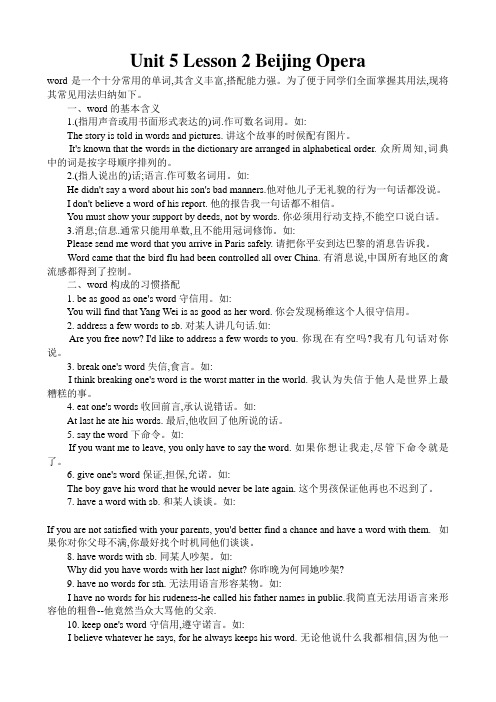
Unit 5 Lesson 2 Beijing Operaword是一个十分常用的单词,其含义丰富,搭配能力强。
为了便于同学们全面掌握其用法,现将其常见用法归纳如下。
一、word的基本含义1.(指用声音或用书面形式表达的)词.作可数名词用。
如:The story is told in words and pictures. 讲这个故事的时候配有图片。
It's known that the words in the dictionary are arranged in alphabetical order. 众所周知,词典中的词是按字母顺序排列的。
2.(指人说出的)话;语言.作可数名词用。
如:He didn't say a word about his son's bad manners.他对他儿子无礼貌的行为一句话都没说。
I don't believe a word of his report. 他的报告我一句话都不相信。
You must show your support by deeds, not by words. 你必须用行动支持,不能空口说白话。
3.消息;信息.通常只能用单数,且不能用冠词修饰。
如:Please send me word that you arrive in Paris safely. 请把你平安到达巴黎的消息告诉我。
Word came that the bird flu had been controlled all over China. 有消息说,中国所有地区的禽流感都得到了控制。
二、word构成的习惯搭配1. be as good as one's word 守信用。
如:You will find that Yang Wei is as good as her word. 你会发现杨维这个人很守信用。
2. address a few words to sb. 对某人讲几句话.如:Are you free now? I'd like to address a few words to you. 你现在有空吗?我有几句话对你说。
高中英语Unit 5 lesson 2 Beijing Opera课件4 北师大版 必修2
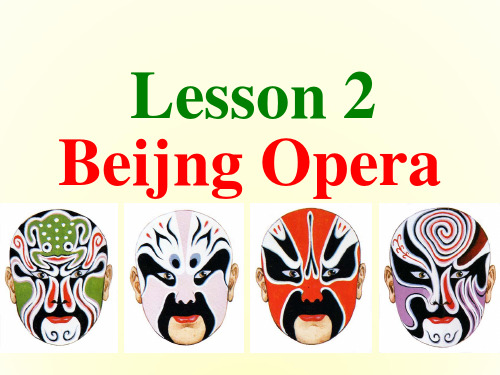
1. what does the stage look like in Beijing Opera?
Very simple.
2. How do symbols play an important role in Beijing?
Many body movements can represent actions such as opening a door, climbing a hill, going upstairs or rowing a boat.
Lesson 2 Beijng Opera
sheng
sheng
dan
dan
jing
chou
sannghu
piano
guitar
combine
treasure
mask
acrobatics
costume
a mixture of two or more things
Zhu Meiling
Listen again and complete the
Function File with these words: would, can’t , let , could , OK ,know ,excuse me ,must, everyone’s going ,can
In order to be seen by the crowds clearly. In order to be heard over the crowds acting, talking, singing, music, dancing and acrobatics
It was performed mostly on open-air stages in markets, streets, teahouses or temple courtyards
北师大版英语必修二unit5-l2-2

Formal
(7) _E_x_c_u_s_e_m__e_, Miss Wang?(8) _W__o_u_l_d_it be all right if I handed in my project next week? OK, you (9) _c_a_n__give me your project first thing on Monday morning.
• Do your parents permit you to go?
• How do you ask for permission?
• How do your parents give or refuse your permission?
Sum up
would, can’t, let, could, OK,
•
• Susan left Hongdong county, • and she is coming to the
same street.
• Angry before I speak, • oh, listen to me, gentlemen.
• Who is going to Nanjing? • Please give my lover this mess
age
• that is Susan is dead. • In the next life,
she will repay his kindness.
HOMEWORK
哼唱京戏或听录音,体会汉 英语的区别
Learning Objectives
• Review the information related to Beijing Opera
• To practice asking for, giving and refusing permission.
北师大高中英语必修二Unit-5-Lesson-2-Beijing-Opera

Group Work
➢ Choice 1 a chart in details ➢ Choice 2 verbal phrases ➢ Choice 3 free expressions
➢Choice 1 a chart in details
3. What are the main instruments played in Beijing Opera? a) violin b) jinghu c) drum d) piano e) sanxian f) guitar
4. Match the main roles with their
Wh-quewtions What skills…? Where was …performed? Why…music/singing…?
5 Listening Strategies(p24)
No. 3 Listen and identify key words to help you answer the questions.
2.Where was Beijing Opera performed at the beginning ? Places ____________ ,_____,________...
3.Why does it have very loud music and a sharp singing style? Because ___,____...
1. When did Beijing Opera start? a) the late 18th century b) the late 19th century c) the late 20th century
高中英语新北师大版版精品教案《北师大版高中英语必修2 Lesson 2 Beijing Opera》

Unit 5 Lesson 2 Beijing OperaXiao HuajingNo.5 Senior High School of HuainanTeaching aim:1 To practice using general knowledge to think of possible answers before listening.2 To practice identify key words to help you answer the questions.3 To practice getting the general idea when listening for the first time.4 To help the students know about Beijing Opera.Teaching materials:Lesson2, Unit 5. Module 2Teaching aids:A multimedia computer, A tape recorderTeaching Procedures:Step1 Lead-in (CW)1 Give some background information about Beijing Opera to the students with the PPt(2-14)History:Characters:The Costume and Masks:Instruments:Four Main Roles:2 Brief Introduction of Mei Lanfang.(ppt15)Step 2 Listening Strategies〔CW, ppt16〕Present the listening strategies to the student with the help of ppt16. Help the students to understand.Step 3 Listening Practice I(IW,pp17)Task1: Listen to the tape carefully and complete the sentences with key words.The art started in the late 18th century and it combines ________, ________, ________, music, ________ and ________.In the early days, Beijing Opera was most often performed on __________ in __________, __________, __________ or __________. The music had to be played __________ and the performers had to sing with ______________, in order to be heard over the crowd.Beijing Opera was often performed on open-air stages and stages were lit by oil lamp. If the costume weren’t in ____________, the crowds wouldn’t be able to ____________.Step4 Listening Practice II(IW,ppt18)Task 2: Listen and use the strategies to answer the questions listed on the screen. Questions:1 What skills do Beijing Opera actors need to have?2 Where was Beijing Opera performed at the beginning?3 Why does it have very loud music and sharp singing style?4 Why do performers wear brightly coloured costume?Step5 Listening PracticeIII (IW,ppt19)Task 3: Students read and listen to the last part of the program. Then answer the questions below:1 What does the stage like in Beijing Opera?2 How do symbols pay an important role in Beijing Opera?Step6 Summary(IW,ppt22-23)Guide the students do a summary by finishing the information chart:Step 7 Speaking:(PW.ppt24)Students practice in pairs to have a talk about Beijing Opera with the help of the Summary.Step 8 Homework:Write a short composition about Beijing Opera.。
【公开课教案】北师版英语必修二Unit 5 Rhythm Lesson 2 Beijing Opera
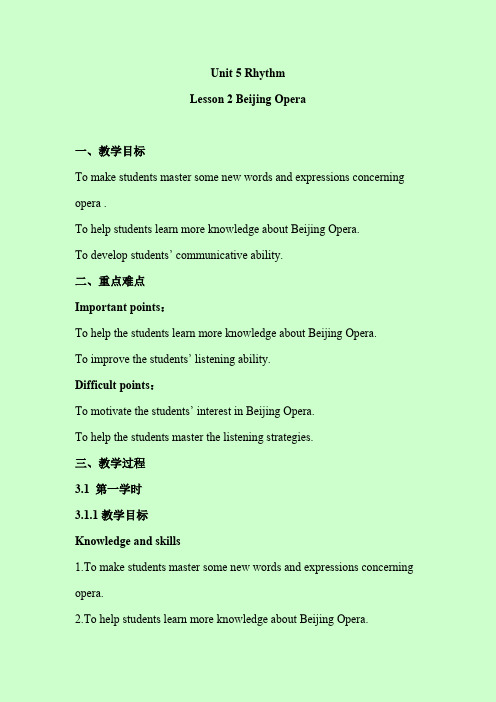
Unit 5 RhythmLesson 2 Beijing Opera一、教学目标To make students master some new words and expressions concerning opera .To help students learn more knowledge about Beijing Opera.To develop students’ communicative ability.二、重点难点Important points:To help the students learn more knowledge about Beijing Opera.To improve the students’ listening ability.Difficult points:To motivate the students’ interest in Beijing Opera.To help the students master the listening strategies.三、教学过程3.1 第一学时3.1.1教学目标Knowledge and skills1.To make students master some new words and expressions concerning opera.2.To help students learn more knowledge about Beijing Opera.3.To develop students’ communicative ability.Process and methods1. Improve students’ listening ability by using one of the listening strategies--listening for understanding.2. Develop students’ self-access ability to a given topic.Emotion, attitude and value1. To develop students’ interest in Beijing Opera.2. To arouse students’ love for our country and our own cultural treasure.3.1.2学时重点1) To help the students learn more knowledge about Beijing Opera.2) To improve the students’ listening ability.3.1.3学时难点1) To motivate the students’ interest in Beijing Opera.2) To help the students master the listening strategies.3.1.4教学活动Step1 Lead-inTeacher plays a piece of opera, and ask students if they know whatkind of opera it is,and ask what do they know about Beijing Opera. Step2 ListeningStrategiesTeachers show the listening strategies to students and ask them if they know how to use it.Step3 UselisteningstrategiesLet students do as the listening strategies.Listen carefully and write down the answers.Then check and read the answers.Step4 Post-listeningHelp students go over the information of Beijing Opera.Students work in pairs and talk about Beijing Opera.Step5 HomeworkTeacher encourages students to retell the information of Beijing Opera.。
北师大版英语必修二unit5-l2-1
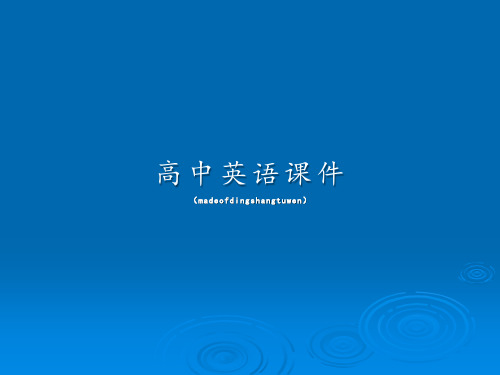
the questions. 4.The first time you listen, try to get the general
idea and take notes. 5.The second time you listen, listen carefully and
Because symbolism plays a very important role in Beijing Opera.
Review Listening Strategies
1. Before listening, read the questions. 2. Use your general knowledge to think of possible
2.Where was Beijing Opera performed at the beginning ? Places ____________ ,_____,________...
3.Why does it have very loud music and a sharp singing style? Because ___,____...
combine
something with special value treasure
movements of one’s body in a skilful
way
acrobatics
something that covers one’s face
mask
1.This golden ring is a real _tr_e_a_s_u_r_e_.
2018秋英语北师大版必修2课件:5.2 Lesson 2 Beijing Opera
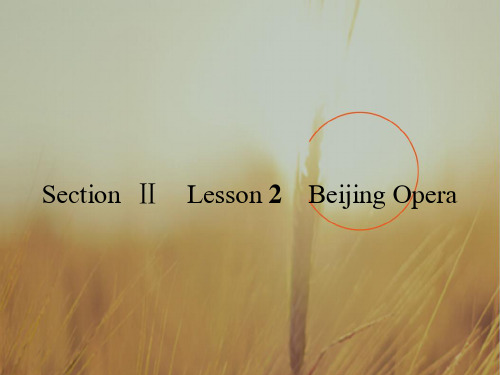
基础导练 知识精要
1234567
基础导练 知识精要
1234567
6.In other words,every action and movement in Beijing Opera is important.(P25) 换句话说,京剧中的每个行为和动作都很重要。 in other words 换句话说 They asked him to leave — in other words,he was unemployed. 他们叫他走人,也就是说,他被解雇了。
We should treasure up such a lesson in our memory. 我们应将这样一个教训铭记在心。
基础导练 知识精要
1234567
基础导练 知识精要
1234567
3.The first step in making a cake is to combine the milk and butter.(P24) 做蛋糕的第一步是要把牛奶和黄油混合起来。 combine vt.使结合,使联合 She combined some sugar,flour and butter to make some cookies. 她把糖、面粉和黄油和在一起做小甜饼。 We can’t always combine work with pleasure. 我们并不总是能在工作中享受到乐趣。
Several factors had combined to ruin our plans. 几种因素加在一起毁了我们的计划。
We will combine our two firms against our competitors. 我们两家公司将联合起来一起对付我们的竞争对手。
2018版高中英语北师大版必修二讲义:Unit 5 Rhythm Period Two Lesson 2 Beijing Opera
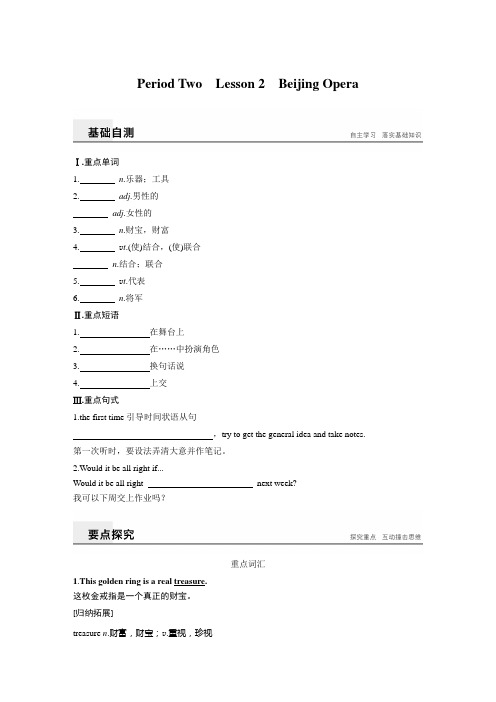
Period Two Lesson 2Beijing OperaⅠ.重点单词1. n.乐器;工具2. adj.男性的adj.女性的3. n.财宝,财富4. v t.(使)结合,(使)联合n.结合;联合5. v t.代表6. n.将军Ⅱ.重点短语1. 在舞台上2. 在……中扮演角色3. 换句话说4. 上交Ⅲ.重点句式1.the first time引导时间状语从句,try to get the general idea and take notes. 第一次听时,要设法弄清大意并作笔记。
2.Would it be all right if...Would it be all right next week?我可以下周交上作业吗?重点词汇1.This golden ring is a real treasure.这枚金戒指是一个真正的财宝。
[归纳拓展]treasure n.财富,财宝;v.重视,珍视national treasures国宝priceless treasures无价之宝treasure up铭记,珍藏[语境助记](1)Knowledge is a treasure, but practice is the key to it.知识是宝库,但实践是打开宝库的钥匙。
(2)Time waits for no man.Treasure every moment you have.时间不等人,珍惜你拥有的每一秒钟。
(3)Some of the lost national treasures have been got back.丢失的国宝有一部分已被找回来了。
(4)We should treasure up such a lesson in our memory.我们应将这样一个教训铭记在心。
[易混辨析]treasure,wealthtreasure专门用来表示宝藏、财宝,也可以用来表示珍爱的人或事物;wealth指的是财富,一般用来表示钱财或其他物质上的财产,也可引申为知识财富。
高中英语 Unit 5 Rhythm Lesson 2 Beijing Opera教案1 北师大版必修2
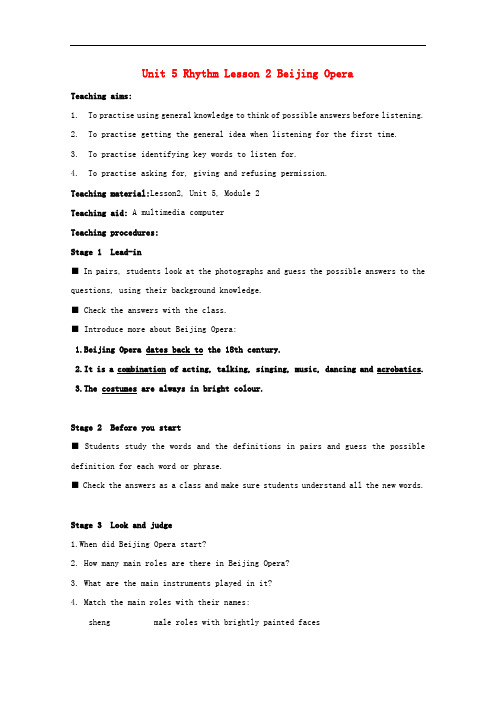
Unit 5 Rhythm Lesson 2 Beijing OperaTeaching aims:1.To practise using general knowledge to think of possible answers before listening.2.To practise getting the general idea when listening for the first time.3.To practise identifying key words to listen for.4.To practise asking for, giving and refusing permission.Teaching material:Lesson2, Unit 5, Module 2Teaching aid: A multimedia computerTeaching procedures:Stage 1 Lead-in■ In pairs, students look at the photographs and guess the possible answers to the questions, using their background knowledge.■ Check the answers with the class.■ Introduce more about Beijing Opera:1.Beijing Opera dates back to the 18th century.2.It is a combination of acting, talking, singing, music, dancing and acrobatics.3.The costumes are always in bright colour.Stage 2 Before you start■ Students study the words and the definitions in pairs and guess the possible definition for each word or phrase.■ Check the answers as a class and make sure studen ts understand all the new words.Stage 3 Look and judge1.When did Beijing Opera start?2. How many main roles are there in Beijing Opera?3. What are the main instruments played in it?4. Match the main roles with their names:sheng male roles with brightly painted facesdan female rolesjing clown roleschou male rolesStage 4 Find out the definition■ Students study the words and the definitions in pairs and guess the possible definition for each word or phrase.■ Check the answers as a class and make sure students understand all the new words.Step 5 ListeningUse the Strategies :Listen & answer the questions.1.What skills do Beijing Opera actors need to have?2. Where was Beijing Opera performed at the beginning?3. Why does it have very loud music and a piercing singing style?4. Why do performers wear brightly coloured costumes?Step 6 TapescriptStage 7 ReadingRead the last part of the programme and answer the questions:1.What does the stage look like in Beijing Opera?2.How do symbols play an important role in Beijing Opera?Stage 8 Useful ExpressionsStage 9 Listening■ Students listen to the dialogue and make notes about Li Ming and Zhu Meiling. ■ Play the dialogue two or three time s if necessary.■ Students can compare answers in pairs before checking answers as a class.Step 10 Function FileStep 11 SummaryStage 12 AssignmentHave you ever seen any shows? Write a passage to describe one unforgettable show you have ever seen.。
北师大版高中英语必修二 U5L2 Beijing Opera
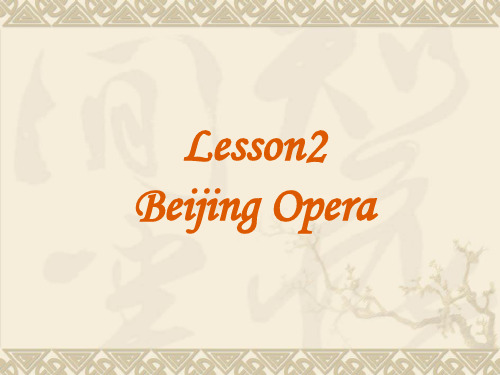
Pic.4
She is on a horse.
Key words
treasure combine mask costume acrobatics
treasure
something with special value
mask
something that covers one’s face
acrobatics
Listen to two dialogues. What do the students Li Ming and Zhu Meiling get permission for? What do they not get permission for? permission Li Ming Zhu Meiling to go to to hand in Pufang’s her project birthday party next week to write up to go to the project the cinema in Chinese
acrobatics but it looks 3.I love watching ___________ very difficult! 4.The first step in making a cake is to ________the milk and butter. combine 5. The singer wore a __________ that was mask made of wood.
not permission
Listen again and fill in the blanks.
would, can’t, let, could, OK, know, excuse me, must, everyone’s going, can
北师大版高中英语必修2U5 Rhythm--Lesson 2 Beijing Opera
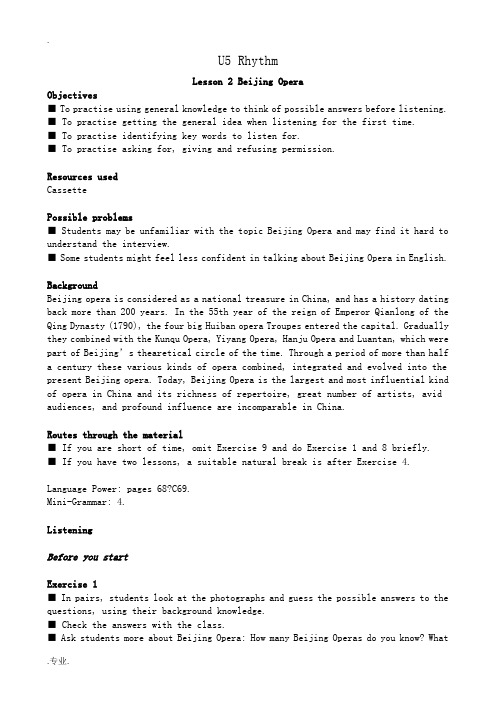
U5 RhythmLesson 2 Beijing OperaObjectives■ To practise using general knowledge to think of possible answers before listening. ■ To practise getting the general idea when listening for the first time.■ To practise identifying key words to listen for.■ To practise asking for, giving and refusing permission.Resources usedCassettePossible problems■ Students may be unfamiliar with the topic Beijing Opera and may find it hard to understand the interview.■ Some students might feel less confi dent in talking about Beijing Opera in English.BackgroundBeijing opera is considered as a national treasure in China, and has a history dating back more than 200 years. In the 55th year of the reign of Emperor Qianlong of the Qing Dynasty (1790), the four big Huiban opera Troupes entered the capital. Gradually they combined with the Kunqu Opera, Yiyang Opera, Hanju Opera and Luantan, which were part of Beijing’s thearetical circle of the time. Through a period of more than half a century these various kinds of opera combined, integrated and evolved into the present Beijing opera. Today, Beijing Opera is the largest and most influential kind of opera in China and its richness of repertoire, great number of artists, avid audiences, and profound influence are incomparable in China.Routes through the material■ If you are short of time, omit Exercise 9 and do Exercise 1 and 8 briefly.■ If you have two lessons, a suitable natural break is after Exercise 4.Language Power: pages 68?C69.Mini-Grammar: 4.ListeningBefore you startExercise 1■ In pairs, students look at the photographs and guess the possible answers to the questions, using their background knowledge.■ Check the answers with the class.■ Ask students more about Beijing Oper a: How many Beijing Operas do you know? Whatdo you think of Beijing Opera? Can you name some famous actors and actresses? Do you think people enjoy watching Beijing Opera? Why or why not? ...Answers1 a2 a3 b4 sheng―male roles; dan―female roles;jin g―male roles with brightly painted faces; chou―clown rolesExercise 2■ In pairs, students look at the pictures carefully and make guesses where the characters are. Remind students that the costumes they wear and the stage designs will be of great help.■ Students do the matching in pairs.■ Check the answers as a class.AnswersPicture 1 She’s on a horse.Picture 2 They are in their new bedroomPicture 3 She’s in a carriage.Picture 4 They are in a city.Exercise 3■ Students study the word s and the definitions in pairs and guess the possible definition for each word or phrase.■ Check the answers as a class and make sure students understand all the new words.Answersa) costume b) combine c) treasure d) acrobatics e) mask1 treasure2 costume3 acrobatics4 combine5 maskListen to learnExercise 4■ Read through the Strategies with the class and see if they know how to use any of these Strategies already.■ In pairs, students read the questions and try to predict the answers usi ng background knowledge about Beijing Opera.■ Students then exchange ideas to find out if they have the same predictions. If they have made different predictions, ask students to justify their opinions.■ Students listen to the cassette and get the gene ral idea. Play the cassette without pausing the first time. And ask them to make notes if possible.■ When replaying the cassette, pause it after each section to give students time to check their answers.Possible answers1 Acting, talking, singing, music, dancing and acrobatics.2 On open-air stages in markets, streets, teahouses or outside temples.3 Because at the beginning, Beijing Opera was performed mostly on open-air stages, the music had to be played loudly and the performers had to sing with sharp voices.4 Because with bright color, the audience can see the actors and actresses more clearly.TapescriptSection 1Presenter:Welcome to What's Your Rhythm. In today's programme, we're going to discuss Beijing Opera. But first, we have Professor Shang Xiaoming, to introduce us to the topic. We have also invited to the studio two high school students who want to know more about Beijing Opera. Professor Shang, what is Beijing Opera and when did it start? Prof. Shang: Beijing Opera is a national treasure of China. The art started in the late 18th century and it combines acting, talking, singing, music, dancing and acrobatics.Actors play one of four roles: sheng, male roles; dan, female roles; chou, clown roles and jing roles with brightly-painted face masks. Each role has its own singing and acting styles.Presenter: Professor Shang, could you tell us something about the style of the music and singing in Beijing Opera?Prof. Shang: Yes, certainly. In the early days, Beijing Opera was most often performed on open-air stages in markets, streets, teahouses or outside temples. The music had to be played loudly and the performers had to sing with sharp voices, in order to be heard over the crowds. Slowly, this kind of singing became a special style of Beijing Opera.Student 1: Professor Shang, the costumes in Beijing Opera are often very bright. Why is this?Prof. Shang: That's a good question. As I mentioned just now, Beijing Opera was often performed on open-air stages and the stages were lit only by oil lamps. If the costumes weren't in bright colours, the crowds wouldn't be able to see them clearly.Exercise 5■ Encourage students to guess the possible answer to each question.■ Students listen to the cassette and get the general idea.■ Students scan the dialogue and identify the key words or phrases to help answer the questions.■ Students check the answers in pairs before checking them as a class.■ Encourage students to give more such examples using their general knowledge of Beijing Opera.■ Students work in pairs, asking and answering the questions.■ Students listen to the complete programme again. Then have some of them talk about the features of Beijing Opera in class.Answers1 Very simple.2 Many body movements can represent actions such as opening adoor, climbing a hill, going upstairs or rowing a boat.Exercise 6■ Students listen to the dialogue and make notes about Li Ming and Zhu Meiling. ■ Play the dialogue two or three times if necessary.■ Students can compare answers in pairs before checking answers as a class.■ Play the dialogues again and ask students what differences there are in the situations and the language ( the first is more informal between a mother and son.) AnswersLi Ming―- permission to go to Pufang’s birthday party / no permission to go to the cinema.Zhu Meiling―-permission to hand in her project next week/ no permission to write up the project in Chinese.Tapescript1Mum: Yes, what is it? … I’m in a bit of a hurry.Li Ming: You know my classmate Yang Pufang.Mum: Is he the boy whose father is a doctor?Li Ming: Yes, that’s the one. Well, Pufang’s going to have a birthday party this Saturday afternoon. Is it OK if I go?Mum: But your grandpa and grandma are coming to stay with us this weekend.Li Ming: Please Mum. The party’s a special occasion and everyone’s going to it. Mum: Oh, all right … I’ll let you go, but I need you to be back by 8 o’clock the latest.Li Ming: Thanks, Mum. And I was thinking … can I go to the cinema with Pufang on S unday? There’s a really good cartoon showing.Mum: What about your grandpa and grandma? Who’s going to help me look after them if you go?Li Ming: Oh, Mum. Please let me go to the cinema.Mum: You can go to Pufang’s birthday party but you can’t go to the cinema. I’m sorry, but I’m going to need your help this Sunday.That’s my final word!Li Ming: OK.2Meiling: Excuse me, Miss Wang?Miss Wang: Yes, Meiling.Meiling: Would it be all right if I handed in my project next week?Miss Wang: But you’ve h ad an extra week already.Meiling: Well, I’ve been ill all week and haven’t been able to do the work. Miss Wang: Are you better now?Meiling: Yes, much better. Thank you.Miss Wang: OK, you can give me your project first thing on Monday morning.Meili ng: Thank you, Miss Wang. There’s one more thing.Miss Wang: Yes?Meiling: Could I write up the project in Chinese?Miss Wang: No, I’m afraid you can’t. You must use English like all the other students.Meiling: OK.■ Play the dialogues again and as k students what differences there are in the situations and the language ( the first is more informal between a mother and son.) Exercise 7■ Students read through the Function File and guess what the missing words are before they listen to the cassette again.■ Students listen to the cassette and complete the sentences.Answers1 know2 OK3 everyone's going4 let5 can6 can't7 Excuse me 8 Would 9 can 10 Could 11 must■ Check answers by having students read the sentences aloud. Students can then s ee if their guesses were correct.SpeakingExercise 8■ Read through the table with the class.■ Students then work individually, thinking of good reasons why they need permission to do the things.■ Read through the example dialogue with the class, and point out that all the situations are formal ones so we need formal language.■ In pairs, students act out their dialogues. Go round and monitortheir language and go over any general mistakes at the end.■ Some of the pairs can act out one of thei r dialogues for the class.Exercise 9■ Read the instructions and the example sentences with the class.■ Students then work individually, writing five sentences including one false one. ■ In groups, students read out their sentences and see if the ot hers can guess the false one.OptionsPracticeIn pairs, students prepare and act out an informal dialogue askingpermission to do something. The dialogue could be between a parent and teenager or an older brother or sister and teenager.ExtensionIn groups, students discuss what image their own town had in the past and how and why it has changed.。
Unit5Lesson2《BeijingOpera》课件(23张ppt)(北师大必修2)

Beijing opera is a historical art form, traditional music and singing are used to tell a story on stage. The rhythm plays a part in telling the story. It can get faster and louder, or make sudden stops to go with the action.
• What do the students Li Ming and Zhu Meiling get permission for? What do they not get permission for ?
Li Ming
Permission to go to Pufang’s birthday party No permission to go to the cinema
Permission to hand in her project next week No permission to write the project in Chinese
Zhu Meiling
• Listen again and complete the Function File with these words:
It was performed mostly on open-air stages in markets, streets, teahouses or temple courtyards
3. Why does it have very loud music and a sharp singing style?
• 1.d to have?
北师大版高中英语Boo 2 Unit 5 Rhythm lesson 2 Beijing Opera教学课件

The costumes in Beijing Opera are often very b_r_i_g_h_t, because the crowds would be able to see them clearly.
Welcome
Lesson 2 Beijing Opera
Ex.1 Listening for the general idea What are talked about Beijing Opera?
• History • Roles • Mei Lanfang • Music and singing • Costumes
four roles acting,talking
late 18th century
main roles
skills
history
singing, dancing
Beijing Opera
acrobatics
costumes
bright
music and singing
Loud, sharp
Speaking: Work in group of four and introduce Beijing Opera or Yue Opera to American students.
costumes
the northeast duet
music singing
loud (play) (with)sharp, high voice
北师大版英语必修二Unit5 Lesson 2 课件
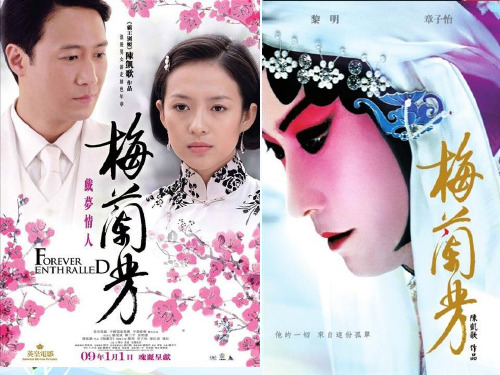
adj. adj. n.
n. vt. n. vt. n.
male female carrige
treasue combine mask represent general
面具,面罩 代表 将军
Step 3 Background
Beijing opera of China is a national treasure with a history of 200 years. In the 55th year of the Qing Dynasty(清朝) (1790), the four big Huiban opera Troupes entered the capital(四大
clappers
drum
jinghu
gong
bass gong
main roles history skills needed
Beijing Opera
costume
instrument
Step 5
The first time:
Listening 1)
The passage mainly talks about the
morning.
(10) ______ Could I write up the project in
Chinese?
No, I’m afraid you can’t. You (11)
_____ must use English like all the other students.
Step 5 Listening 3)
- 1、下载文档前请自行甄别文档内容的完整性,平台不提供额外的编辑、内容补充、找答案等附加服务。
- 2、"仅部分预览"的文档,不可在线预览部分如存在完整性等问题,可反馈申请退款(可完整预览的文档不适用该条件!)。
- 3、如文档侵犯您的权益,请联系客服反馈,我们会尽快为您处理(人工客服工作时间:9:00-18:30)。
the
clothes worn in a play or film
costume
mix two or more things The first step in making a cake is to combine _______ the milk and butter.
treasure
walking with a flag on each side
four generals and four soldiers
(马鞭子)
holding a tassel
Music Instruments
A
Band
mask
something
that covers one’s face
mask
Group Work
Choice
1 a chart in details Choice 2 verbal phrases Choice 3 free expressions
Choice
1 a chart in details
Beijing Opera is a national treasure of China. The art started in the late 18th
Listen and use the strategies!
1. What skills do Beijing Opera actors need to have ? Acting, talking, singing, music dancing and acrobatics.
2. Where was Beijing Opera performed at the beginning ?
in Beijing Opera?
Very simple.
2. How do symbols play an
important role in Beijing Opera?
Because symbolism plays a very
important role in Beijing Opera.
Review Listening Strategies
M2 Unit 5 lesson 2 Beijing Opera
Period one
教材分析
第五单元第二课:要求学生熟
悉京剧表演艺术;学习听力技
巧,更好地完成听力任务;练
习表示请求及拒绝的正式和非
正式的英语表达。
学情分析
大部分学生听说能力不强, 故设计小步走梯度小的课堂
活动。让学生从输入到输出,
Five Listening Strategies
No. 1 Before listening, read the questions.
1.What skills do Beijing Opera actors need to have ? The skills are ____ _______ _____ … 2.Where was Beijing Opera performed at the beginning ? Places ____________ ,_____,________... 3.Why does it have very loud music and a sharp singing style? Because ___,____... 4.Why do performers wear brightly coloured costumes? Because ________________.....
1. Before listening, read the questions. 2. Use your general knowledge to think of possible answers. 3.Listen and identify key words to help you answer the questions. 4.The first time you listen, try to get the general idea and take notes. 5.The second time you listen, listen carefully and try to note down the answers.
Do you know them?
questions
1. Do you know Beijing Opera?
2. How many roles are there in Beijing Opera? 3. Can you name some famous actors or actresses? 4. Do you think people enjoy watching Beijing Opera?
4. Why do performers wear brightly coloured costumes?
With bright colour, their costumes are more impressive and the crowd can see them more clearly.
Read and listen to the last part of the programme. Then answer the questions. 1. What does the stage look like
完成学习过程。
Procedure
Warm Up
Background Knowledge
Listening
Vocabulary (10 min) pictures (3 min) Listening (10 min)
questions (5 min)
Retelling ( 12 min)
Consolidation ( 5 min)
Learning Objectives
Learn
some useful words related to Beijing
Opera Learn some strategies of listening for understanding Get familiar with Beijing Opera.
something
with special value
movements
of one’s body in a skilful
way
acrobatics
Let’s review new words
the clothes worn in a play or film costume mix two or more things combine something with special value treasure movements of one’s body in a skilful way acrobatics something that covers one’s face
5 Listening Strategies(p24)
No.2 Use your general knowledge to think of possible answers.
Wh-quewtions What skills…? Where was …performed? Why…music/singing…?
5 Listening Strategies(p24)
No. 4 The first time you listen, try to get the main idea and take notes.
No. 5 The second time you listen, listen carefully and try to note down the answers.
2. How many main roles are there in Beijing Opera? a) 4 b) 8 c) 12
3. What are the main instruments played in Beijing Opera? a) violin b) jinghu c) drum d) piano e) sanxian f) guitar
4. Match the main roles with their names. sheng male roles with brightly painted face dan female roles jing clown roles chou male roles
Various body movements can represent actions. riding a an army of riding in a horse thousands carriage
mask
1.This golden ring is a real
________. treasure 2.My mother sewed my _______ costume for the school play.
3.I love watching __________ acrobatics but it
5 Listening Strategies(p24)
No. 3 Listen and identify key words to help you answer the questions.
talking
acrabatics stages teahouses crowds colours clearly simple movements
sheng
What kind of role is the man?
dan
What kind of role is the woman?
jing
